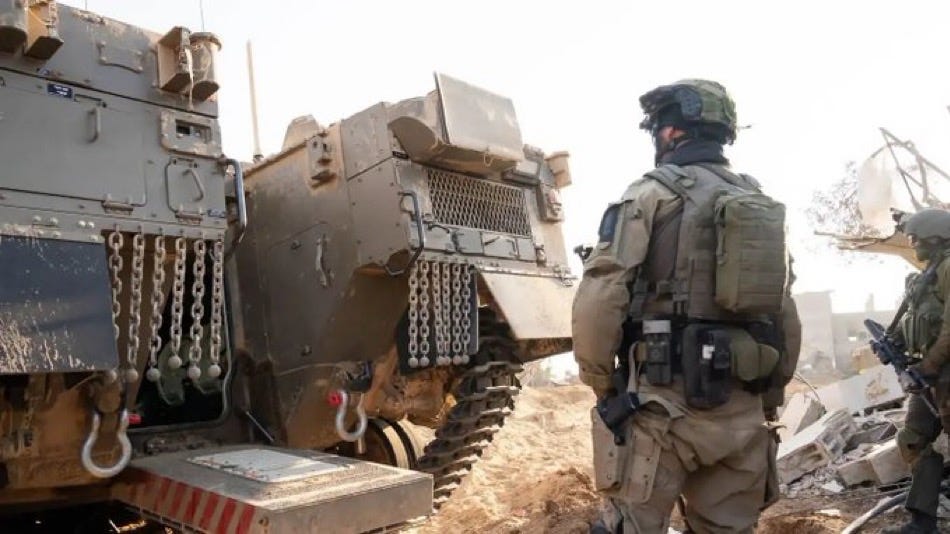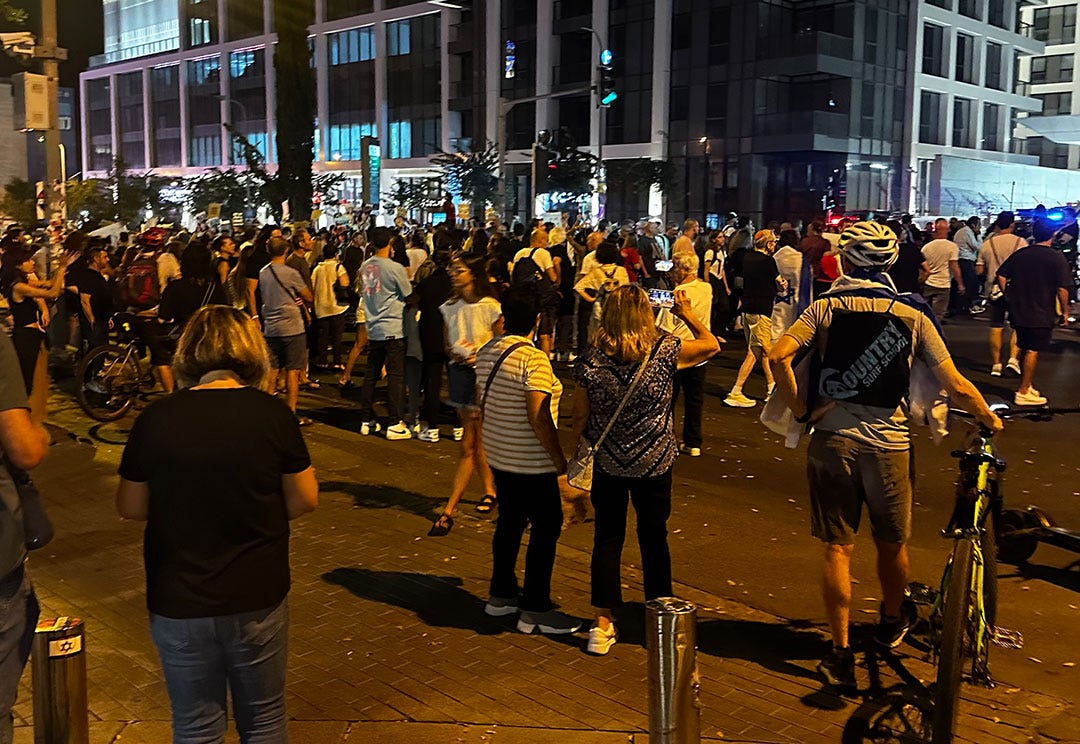DAY 29 OF THE GAZA WAR: Blinken Visit, Nasrallah Blinks, IDF is Deep in Gaza City
Tel Aviv Diary November 4, 2023
As the conflict persists in Gaza, US Secretary Blinken returned to Israel on Friday, meeting with Prime Minister Netanyahu, members of the war cabinet, opposition leader Yair Lapid, and the President. His visit concluded with a press conference. Blinken delivered several key messages. Firstly, he advocated for increased humanitarian aid for Gaza. Secondly, he urged Israel to consider the post-conflict landscape. Thirdly, he expressed steadfast support for what Israel endured and its mission to dismantle Hamas
.
During live commentary on i24News, I found myself in disagreement with my colleague Owen Alterman, the network's Senior Diplomatic Correspondent. He interpreted Blinken's remarks as a sign the U.S. fails to grasp the transformative impact of the events of October 7th, since Blinken repeatedly mentioned a two-state solution. I contended that Blinken's reference to a two-state framework is necessary to retain Arab support, given the absence of any alternative proposal. This stance aligns with the pre-existing view of the Biden Administration, which acknowledges the unlikelihood of any current peace agreement but wishes to preserve a two-state solution as a future potential option.
The most critical point Blinken made, in my view, was in response to a BBC correspondent's inquiry: “The world awaits a ceasefire; when will you compel Israel to agree to one?” Blinken’s answer was unequivocal: “The U.S. will not press for a ceasefire until Hamas is dealt with.” This sentiment was echoed in Secretary Blinken’s meeting with Arab Foreign Ministers, where he repeated his position, opposing a ceasefire despite the other attendees calling for one. None of the participants contested the objective of eliminating Hamas
.
Blinken has been advocating for brief ceasefires to facilitate humanitarian efforts. However, Israel has rejected any proposal for a humanitarian ceasefire that does not address the issue of its 240+ hostages being held by Hamas for 29 days and counting.
Friday, Hezbollah's head, Hasan Nasrallah, delivered a speech. Prior to the address, there was speculation that Nasrallah might announce some dramatic development, such as Hezbollah fully engaging in the conflict. However, the speech, which lasted nearly two hours, was far from notable. The key takeaway from Nasrallah's exceedingly long speech was his assertion that October 7th was a significant Palestinian achievement, one that occurred without Hezbollah's involvement — thus, distancing himself from Hamas’s predicament. While Nasrallah issued a slew of general threats and pledged support to Hamas, it is expected that Nasrallah’s support will continue at the same level as before, i.e., daily exchanges of fire with the IDF along our northern border. However, today, there was a minor escalation, with Hezbollah firing two heavier rockets at IDF positions, both of which landed in open fields.
In Gaza, the battle has intensified. The IDF has encircled Gaza City, with incursions into central areas of the city. During a visit with troops inside Gaza, the IDF Chief of Staff re-articulated this war’s objective: to demolish as much of Hamas’s infrastructure as can be achieved and to eliminate as many Hamas terrorists as possible. Both IDF Chief of Staff Halevy and Defense Minister Galant have affirmed their commitment to removing Hamas from power in Gaza, with Galant specifically targeting the head of Hamas’s military wing, Yahya Sinwar, for elimination, referring to Sinwar as “a dead man walking”.
Despite rapid progress by the IDF in destroying Hamas infrastructure, Hamas’s tunnel network is incredibly extensive. As a result, there are few areas completely free from Hamas's presence. Hamas squads frequently emerge from tunnel entrances to engage IDF forces with RPGs and other anti-tank missiles. Fortunately, the latest generation of protected armored vehicles has proven effective, and the IDF’s superior firepower typically results in the death of most terrorist attackers. However, the IDF still continues to incur casualties, and it is anticipated that more names of IDF fallen will be released tomorrow. The expectation is that the IDF will soon target the core of Hamas's command centers, but a complete eradication of Hamas from Gaza is expected to take months, at the very least.
Rocket fire from Gaza is on the decline. Today, there was one barrage of rockets directed towards central Israel, with other rockets targeting communities around Gaza and Ashkelon. A long-range missile was also launched toward Eilat, which was successfully intercepted by the Arrow defense system, the second time Arrow has been employed.
Four weeks into the war, the first polls have been released, reflecting the public's sentiment. When asked about their satisfaction with how Netanyahu is handling the war, 56% expressed dissatisfaction, while 28% said they had confidence in the Prime Minister. In response to what actions Netanyahu should take, 47% suggested he should resign after the war, 29% felt he should resign immediately, and 18% believed he should continue in his role. A majority, 64% of respondents, supported the idea of holding elections after the war, with only 26% opposing it.
Both yesterday and tonight, large demonstrations were held in support of releasing the hostages. Additionally, tonight, protests were also held calling for Netanyahu’s resignation. Thousands of individuals participated, with many moving between the two demonstrations
.
An ongoing concern raised by the United States is for Israel to adhere to the laws of war. In a Pentagon briefing following a Thursday phone call between Defense Secretary Austin and Israeli Defense Minister Galant, Air Force Brig. Gen. Pat Ryder stated, "We're having conversations with them [the Israelis] about the importance of taking the law of war into account and ... in our discussions with them, we believe that they are taking it into account." He also said, “The secretary and other Department of Defense officials are having conversations with our Israeli counterparts about the situation in Israel and, again, the importance of protecting innocent lives and taking Palestinians and others into account as they conduct their operations.”
The challenge arises from the vagueness of the laws of war, which prohibit “disproportionate civilian casualties when striking a military target.” This becomes particularly problematic when the enemy uses civilians as human shields. The interpretation of what is considered “disproportionate” is ambiguous and subject to debate. Israeli believes it is, without question, fully following the laws of war.
THE DAY THAT CHANGED EVERYTHING
It was four weeks ago that bloodthirsty Hamas terrorists perpetrated its heinous massacre. Four weeks ago, as Tamar Ish-Shalom (one of the main news anchors on Israel’s Channel 13) said on air — that day changed everything. And indeed, everything has changed.
For the 1,400 individuals brutally murdered that day, their lives came to an abrupt end, and the lives of their immediate families were tragically, forever altered. For the over 240 hostages kidnapped by Hamas — even if they survive — their lives will never be the same. For the rest of the nearly 10 million Israelis, whatever had been planned and/or hoped for shifted dramatically on that day. Whether directly affected by being called to reserves or having a loved one sent to the front lines, life in Israel changed drastically. The impact of the war on those in business or commerce, in many cases, meant a struggle for their company's survival.
The 300,000 Israelis who had been abroad on that day and returned — either to show up for army reserve duty or because they felt their place was in their homeland during a time of war —all found their life paths significantly reshaped.
For those who had dedicated their lives to peace and believed in the possibility of Israeli-Palestinian reconciliation within their lifetimes, that dream was roundly shattered. Residents of some of the most scenic parts of the country, whether along Israel’s northern border or the Gaza Strip, now find themselves living indefinitely in hotels and other temporary accommodations. For the ultra-Orthodox, who had been confident they would receive a permanent draft exemption from this ultra-conservative government, they came to the realization that such an exemption will very likely never materialize.
For Israelis who had always placed their trust in the army’s prowess to guarantee their protection, the events of October 7th obliterated that belief. Israelis who, until October 7th, mocked President Biden, believing the myth that he was feeble and a hater of Israel, now found themselves wishing for a leadership exchange with their Prime Minister. This past month, Biden became the most popular American President in Israel ever.
For Jews around the world, the aftermath of October 7th clarified who are their true allies and adversaries. Moreover, October 7th marked an inflection point for Israel and the Diaspora, an inflection point whose ultimate direction will be revealed in the months and years to come.








As sad as it makes me feel, I do not see how Israel has ANY choice but to rid Gaza of Hamas and close the door to ANY two nation state! If ARAB world will not accept Israel, then Israel has zero choice! I am surprised the USA is not standing stronger!